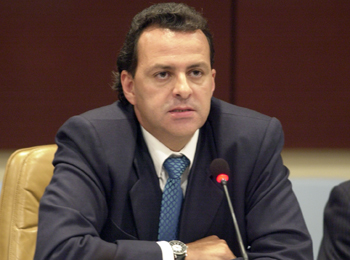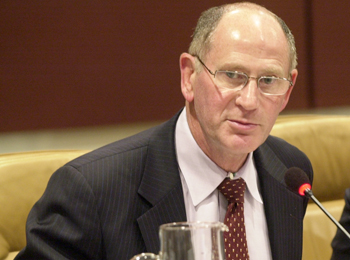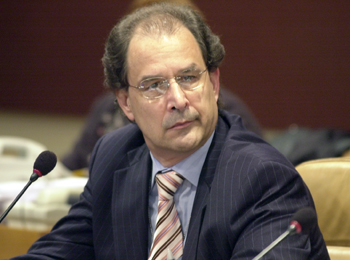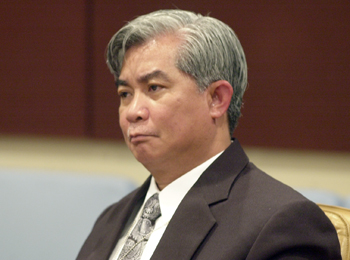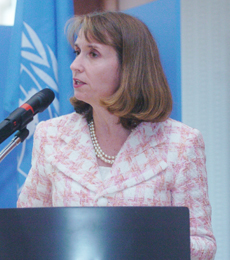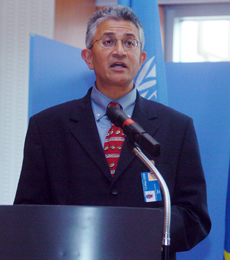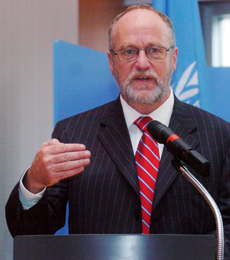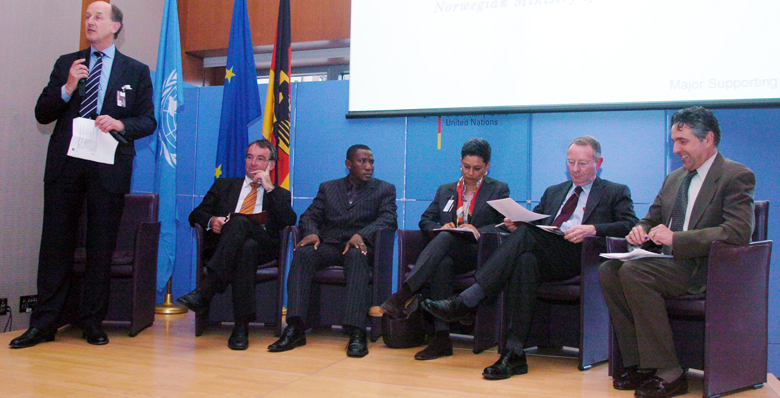 |
||
|
published by IISD, the International Institute for Sustainable Development
in cooperation with the UNDP Secretariat |
|||
|
Special Report on Selected Side Events at the Fourteenth Session of the Commission on Sustainable Development (CSD-14)
|
|||||
| 1-12 May 2006 | United Nations Headquarters, New York | |||||
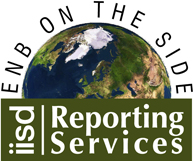 |
 |
|||
 |
||||
Events convened on Wednesday, 10 May 2006
|
Industry as a Partner for Sustainable Development: Presented by UNEP, sponsored by the Governments of Norway and South Africa |
||||
|
Henriette Westhrin, State Secretary for Environment, Norway, highlighted how the Industry Report Cards address the need for corporate and social accountability, and emphasized her country’s support for UNEP. Elizabeth Thabethe, Deputy Minister of Trade and Industry, South Africa, said she remains convinced that there is a business case for sustainability, and emphasized the need to monitor business’ progress in meeting goals established at Johannesburg. Wendy Poulton, Eskom and the International Chamber of Commerce, highlighted the importance of addressing the issue across all sectors, and the need to help developing countries access markets. Lucien Royer, Trade Union Advisory Committee, drew attention to companies that have established framework agreements with trade unions, including provisions for environmental protection, health safety, and union rights. Citing the example of asbestos, he lamented that they still have to lobby industry to respond to their concerns. Steve Sawyer, Greenpeace International, noted that public-private partnerships are no substitute for the enforcement of legally binding agreements. He urged the development of a legal basis for corporate social responsibility (CSR), and for business to not impede the development of progressive legislation. Jan-Olaf Willums, Norwegian School of Management, highlighted the need to encourage CSR entrepreneurship, and that corporations are most likely to listen to the guidance of institutional investors and peer pressure. Jaqueline Coté, World Business Council for Sustainable Development, noted that trust in corporations continues to decline despite rising levels of voluntary codes and mandatory regulation, and that there is a need for companies to integrate sustainability throughout their work, saying that certification can contribute to this. Christian Brodhag, Interministerial Delegate for Sustainable Development, France, emphasized the complimentarity of voluntary and regulatory codes. Highlighting the Global Reporting Initiative, noting that transparency cannot exist without the measurement of substantive performance objectives. Georg Kell, UN Global Compact Office, pointed out the need to clarify the relationship between voluntary and regulatory standards. Noting the explosive growth in the former, Kell urged a transition from quantity to quality. Jane Nelson, Harvard University, urged moving away from a polarized debate over voluntary versus regulatory approaches, and helping developing countries implement existing agreements. She noted indicators used to evaluate whether corporations are taking CSR seriously, including corporate reporting structure, and stakeholder engagement strategies. |
||||
|
|||
|
A Rights-Based Approach to Mainstreaming Gender in Local Decision-Making: Energy, Climate Change, Industrial Development and Air Pollution Presented by the Philippine Women’s University and Asian Women’s Network on Gender and Development, in cooperation with The Philippine Mission to the United Nations |
||
|
Amb. Lauro L. Baja, Jr., Permanent Representative, Philippine Mission to the UN, noted that Helena Benitez, the first Filipina to have chaired the UN Commission on the Status of Women, and the first woman president of the UNEP Governing Council, is an icon for the women’s issues concerning power and sustainable development, and highlighted the importance of examining the activities governments and the international community are undertaking, as well as renouncing, in terms of mainstreaming gender in policy.
Amelou Benitez Reyes, President of Philippine Women’s University, highlighted interest in launching an internet learning tool to share best practices. She said that the role of women and gender mainstreaming using a rights-based approach has not been highlighted within CSD-14 priorities areas, including access to modern energy services, and urged for gender mainstreaming in the decision making process. Daphne D. Roxas, Asian Women’s Network on Gender and Development, said that global advocacy of women cannot occur if ground-level experience is not understood, noted that women’s rights and issues have progressed, and highlighted examples of gender mainstreaming in various UN platforms that underscore the rights-based approach to understanding woman issues, in terms of formulation of policies at the local, national and regional level, including the Fourth World Conference on Women held in, Beijing, China, 1995. Katherine D. Belo, Mayor of the Pamitan Municipality, the Philippines, said her career began at the age of 28, and that at that time was the only female mayor in the Philippines. She highlighted various projects, including a water treatment facility, saying that this forum is important for the mutual sharing of information concerning sustainability. Rita Lyn B. Patricio, Mayor of the Pilar Municipality, the Philippines, explained that she replaced her husband as mayor, noting that prior to this she was a “simple” woman who took care of a family. She addressed the challenge of fulfilling her new role, described her municipality, saying it is rich in natural resources, and emphasized the need to protect them. She closed by saying that she has seen numerous instances of women surmounting the hazards of climate change, and described a mudslide and rescue mission. Participants discussed: the role of trade and labor unions in the Philippines; country policy relating to women’s role in government; allocation in the national budget for women’s programs across every government agency; renewable energy not mainstreamed into society; the social dimension of development; and youth involvement in mainstreaming gender. |
||
|
|||
|
Incorporating Renewables into the Sustainable Development Agenda Presented by the Global Environment Facility (GEF) |
|||||
|
Richard Hosier, GEF, gave an overview of the GEF’s structure and prominent role regarding renewable energy development, noting five related funding areas. He said that the GEF’s strategy focuses on removing barriers by: creating an enabling policy environment; providing financing; supporting business capacity; and facilitating technology deployment. He said that the next period of GEF support will continue to support off-grid renewables, but noted limitations associated with photovoltaics such as cost, and the inability to provide cooking energy. He said on-grid renewables will also be pursued, noting flagship projects in Mexico and China. Jamal Saghir, World Bank, noted their well-established partnership with the GEF. He highlighted support provided, including encouraging countries to adopt new renewable energy technologies, as well as funding. He noted a Sri Lankan case, which resulted in a shift from fossil fuel subsidies to support for renewables, creating market conditions to mainstream renewable energy, including the need to pay attention to policy, provide acces to financing, lower transaction costs, build capacity, and encouraged a flexible and pragmatic approach. Delfin Ganapin, GEF, underlined that the small grants programme embodies the spirit of creating local solutions to global problems, using both regular grants up to US$50,000, and strategic projects up to US$150,000. He noted that this programme takes a broader look at productive end-uses. He presented several examples of successful projects funded, including one in the Palestinian Authority, where it has enabled solar street lighting, and another project in Tanzania that enabled cash cropping through wind energy. Juan Mata, Secretary of Energy, Mexico, said that only 6% of Mexico’s energy is linked to renewables, primarily fuelwood, but noted that decreasing reliance on hydrocarbons is a goal, and that they are well-positioned to develop wind and geothermal resources. He noted that state control of electricity transmission and production has posed barriers to private sector participation. He described initiatives to encourage renewable energy development, including those linked to GEF and World Bank funding. He noted an off-grid renewables project targeted at rural areas, with funding from the GEF. Participants discussed: the need to link renewables with water and children’s health issues; the lack of attention paid to Africa; and the resource allocation framework. |
|||||
|
|||
|
The Supporting Entrepreneurs for Environment and Development (SEED) Initiative Forum: A Network for Partnerships Presented by IUCN, UNEP and UNDP |
|||
|
Mohammed Valli Moosa, President of IUCN, welcomed participants to the first SEED Initiative forum, saying the initiative, which arose from the WSSD, aims at inspiring and developing locally-driven entrepreneurial partnerships. He highlighted the SEED Initiative Partnership Report 2006, saying in the next cycle people can expect a more representative network of partnerships. He highlighted two of the SEED Award winners: Harvesting Seabuckthorn at the Top of the World and Madagascar’s First Community-run Marine Protected Area, and recognized IUCN’s vital role in keeping the process alive.
Sigmar Gabriel, Federal Minister for the Environment, Nature Conservation and Nuclear Safety, Germany, noted that the first call for submissions to the SEED Awards attracted more than 260 applications, even though the winners do not receive funding. He launched the second call for submissions to the SEED Awards for 2006-2007, noting that future environmental and energy policies need the entrepreneurial spirit. Paula Dobriansky, Under-Secretary of State, US, said the WSSD identified the issue of access to energy, saying that discussion of this topic at CSD-14 stems directly from the summit, and spotlighted the need for partnerships to achieve MDGs and Johannesburg Plan of Implementation (JPOI). She highlighted the Cows to Kilowatts projects as an exemplary partnership, and emphasized the US’s strong support of the initiative, saying they would donate $100,000 for the second cycle. Derrick Hanekom, Deputy Minister of Science and Technology, South Africa, accepted the invitation to be part of the world board as a representative from a developing country, and emphasizing that the initiative is conceptually solid, that South Africa has worthwhile experiences to share with other countries, and that it has an important role to play in the development of the poorest countries in Africa. Monique Barbut, Director of UNEP, focused on the Global Marketing Partnership for SRI Indigenous Rice, saying that the initiative has helped the partnership develop an international marketing strategy, and highlighted two finalists in India and Morrocco, supported by UNEP. She emphasized that one of the strong aspects of the initiative is the partnership between UNEP and UNDP. Joseph Adelgan, SEE Award Winner “Cows to Kilowatts”, Nigeria, then provided an overview of the project as the introduction to a panel conversation involving Pieter van Geel, State Secreatry of VROM, Olav Kjorven, Director, UNDP, Laura Tlaiye, Word Bank, and Robert Lowson, Defra, facilitated by Paul Hohnen, Sustainability Strategies, UN discussed how global level initiatives help to support locally driven entrepreneurial partnerships. |
|||
|
||
|
Click the above button to go back to our ENB main coverage
|
||
|
|
|
|
|
||
|
-tn.jpg)
-tn.jpg)
-tn.jpg)
-tn.jpg)
-tn.jpg)
-tn.jpg)
-tn.jpg)
-tn.jpg)
z-tn.jpg)
-tn.jpg)
-tn.jpg)
-tn.jpg)
-tn.jpg)
-tn.jpg)
-tn.jpg)
